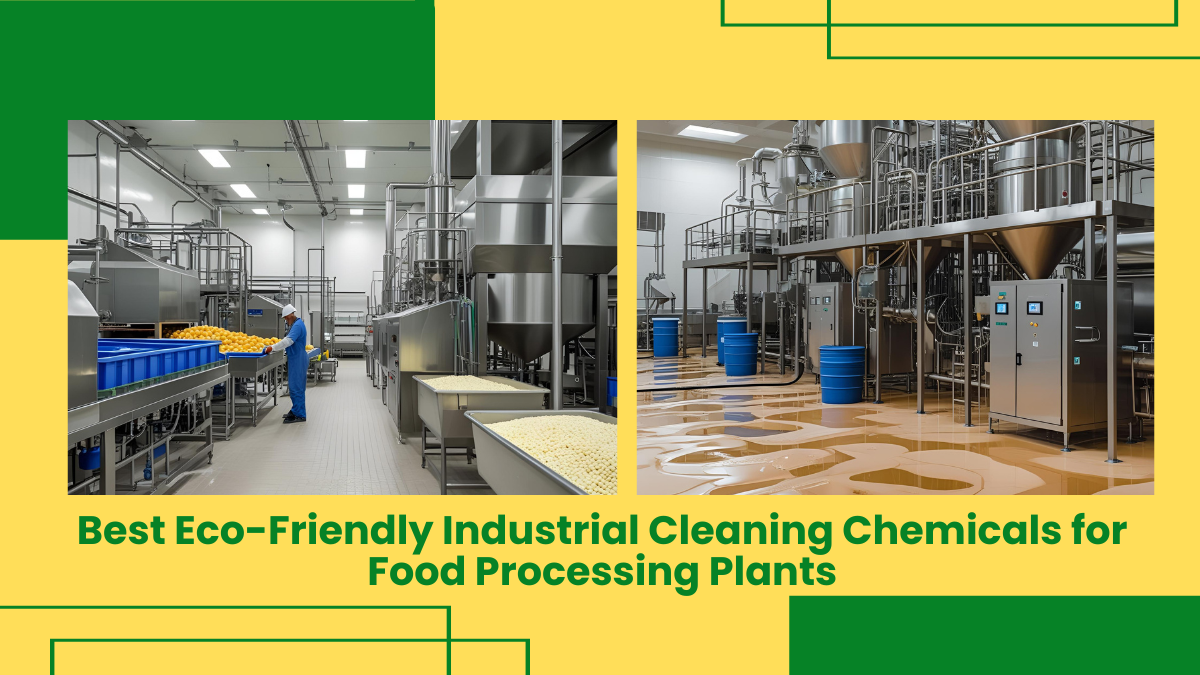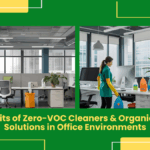Ensuring a clean, hygienic environment in food processing facilities is critical for product safety, regulatory compliance, and operational efficiency. Traditional cleaning chemicals can pose environmental risks, leave behind residues, or damage sensitive equipment. By choosing eco-friendly industrial cleaning chemicals, food processors can protect workers, minimize their ecological footprint, and maintain high sanitation standards. In this guide, we will explore common cleaning challenges, present sustainable solutions from Ecochem’s product range, and share prevention tips to keep your plant running smoothly.
Common Cleaning Challenges in Food Processing Plants
Food processing plants face unique obstacles when it comes to sanitation. The following sections outline the most pressing problems and why conventional approaches may fall short.
Risk of Contamination and Residue
- Cross-contamination: Inadequate removal of proteins, fats, or sugars can lead to bacterial growth.
- Chemical residues: Harsh sanitizers may leave behind compounds that affect product flavor or safety.
- Allergen management: Traces of allergens like nuts or dairy can create serious health risks if not fully eliminated.
Environmental and Regulatory Pressures
- Strict regulations: Agencies such as the Food Safety and Standards Authority of India (FSSAI) mandate low-toxicity, biodegradable cleaning agents.
- Wastewater concerns: Discharging untreated, high-BOD (Biochemical Oxygen Demand) wastewater can attract fines and harm local ecosystems.
- Air emissions: Volatile organic compounds (VOCs) from traditional cleaners may contribute to indoor air quality issues and regulatory violations.
Equipment Damage and Downtime
- Corrosive impact: Acidic or highly alkaline detergents can corrode stainless steel, conveyors, and seals, leading to costly repairs.
- Excessive rinsing: Overuse of water to remove harsh chemicals increases downtime, energy costs, and water consumption.
- Residue buildup: Incomplete rinsing can cause scale formation or sticky films, reducing equipment efficiency and lifespan.
Eco-Friendly Industrial Cleaning Chemical Solutions by Ecochem
Ecochem has developed a suite of eco-friendly industrial cleaning chemicals tailored for food processing environments. Each formula is biodegradable, non-toxic, and free from phosphates or harmful VOCs. Below is an overview of how Ecochem’s offerings address the challenges outlined above.
Biodegradable Detergents and Degreasers
- Food-Safe Formulations: Ecochem’s detergents break down proteins, fats, and sugars without leaving residues. These products rinse cleanly with minimal water, reducing downtime.
- pH-Balanced Cleaners: Neutral-pH degreasers protect stainless steel surfaces and seals from corrosion. They effectively remove oils and greases without damaging metal finishes or rubber linings.
- Low-Foam Options: For high-pressure systems, Ecochem’s low-foam degreasers allow faster rinsing, reducing water usage by up to 30% compared to conventional formulas.
Cleaning Calls For Eco-Greener (Multi-Purpose Cleaner)
Ecochem is growing as a company by offering safe cleaning chemicals at reasonable prices. Our Economical green cleaning products include Eco-Greener – a multi-purpose cleaner. The formulation of user-friendly green cleaning products keeping in mind the safety of users and cleaning staff. Eco-Greener composition offers hygienic and acid-free green multi-purpose cleaning for different areas and spaces.
Non-Toxic Sanitizers and Disinfectants
- Quaternary Ammonium Alternatives: Ecochem’s plant-based sanitizers kill bacteria, yeast, and mold without releasing harmful residues. They comply with FSSAI and global food safety standards.
- Oxygen-Based Sanitizers: Hydrogen-peroxide-based solutions oxidize microbes on contact and break down into water and oxygen, leaving no chemical trace. This is ideal for sensitive equipment or short-dwell applications.
- Broad-Spectrum Disinfectants: Formulated to address Listeria, Salmonella, and E. coli, Ecochem’s disinfectants maintain efficacy in hard-water conditions without adding phosphates.
Specialty Cleaners for Process Lines and Equipment
- Scale Removers: Food plants often contend with mineral buildup in boilers, boilers, evaporators, and heat exchangers. Ecochem’s eco-friendly descaling agents dissolve limescale without hazardous acids and require minimal neutralization.
- Bottle and Line Cleaning Solutions: These products integrate seamlessly with CIP (Clean-In-Place) systems, ensuring consistent cleaning cycles without manual intervention. Their low-odor, biodegradable chemistry minimizes worker exposure.
- Floor and Drain Maintenance: High-traffic floors and drains can harbor pathogens if not treated properly. Ecochem’s floor-care products incorporate slip-resistant foot safety and microbial control, while drain-safe formulas keep pipelines clear of grime and fatty acids.
Give Floor A Glow With Eco-Green Flo!
Eco-Green Flo is a cleaning solution made with extrinsic research from researchers at Ecochem. With our inclination towards bio-based cleaning products, this natural concentrate has strong abilities to sanitize any type of floors gently and adds a mirror shine to the surfaces. With single usage, the solution cleanses ceramic walls, floor tiles, lacquered surfaces, marble floors, marble surfaces, ceramic walls in minutes.
Prevention Tips and Best Practices for Sustainable Cleaning
Effective sanitation in food processing plants involves more than just selecting the right chemicals. Implementing best practices helps prevent issues before they arise and maximizes the performance of eco-friendly industrial cleaning chemicals.
Establishing a Regular Cleaning Schedule
- Risk-Based Cadence: Classify areas by risk level—high-risk zones (e.g., filling lines) require daily cleaning; lower-risk zones (e.g., storage areas) might follow a weekly or biweekly routine.
- Record Keeping: Use digital logs or printed checklists to ensure every step—from pre-rinse to final rinse—is documented. This also helps during audits and inspections.
- Seasonal Adjustments: During warmer months, increase cleaning frequency to combat accelerated bacterial growth. Conversely, in cooler conditions, maintain standard protocols without overusing chemicals.
Proper Dilution and Application Techniques
- Automated Dosing Systems: Integrate Ecochem’s chemicals into existing CIP or dosing equipment to guarantee consistent dilution ratios. This reduces human error and avoids over-concentration, which can waste product or harm surfaces.
- Use of Nozzle-Pressure Guidelines: For manual cleaning, adhere to recommended spray pressures—typically between 40–60 psi—to optimize mechanical removal of soils without splashing or equipment strain.
- Temperature Control: Many organic soils dissolve more readily at slightly elevated temperatures (40–50 °C). Check manufacturer guidelines to avoid compromising chemical stability or damaging heat-sensitive surfaces.
Training Staff and Monitoring Effectiveness
- Comprehensive Training: Conduct hands-on workshops demonstrating correct handling, dilution, and personal protective equipment (PPE) usage. Engage new hires and refresh existing staff every six months.
- ATP Testing and Swab Analysis: Use rapid ATP (adenosine triphosphate) testing devices to verify cleanliness. Implement a swabbing program for critical control points—drains, valves, conveyor belts—to detect residual microbes.
- Visual and Sensory Checks: Train staff to look for streaks, dull spots, or discoloration—indicators of incomplete rinsing. Encourage reporting if unusual odors persist after a cleaning cycle.
Benefits of Choosing Eco-Friendly Industrial Cleaning Chemicals for Food Processing
Adopting eco-friendly industrial cleaning chemicals yields benefits that extend beyond regulatory compliance and safety.
- Enhanced Worker Safety: Low-toxicity formulations reduce skin irritation and respiratory hazards. This leads to fewer absentee days and a more engaged workforce.
- Reduced Environmental Impact: Biodegradable chemicals limit harmful discharge into waterways. Lower BOD levels and reduced phosphates help processors meet effluent guidelines and avoid fines.
- Improved Equipment Longevity: Acid- and alkali-neutral formulas prevent corrosion, protecting stainless steel, seals, and gaskets. This decreases maintenance costs and extends the life of critical machinery.
- Cost Savings Over Time: Although some eco-friendly detergents have a slightly higher upfront cost, reduced water usage, decreased equipment repair, and lower disposal fees translate to long-term savings.
- Brand Reputation and Consumer Trust: Sharing your commitment to sustainability can strengthen relationships with retailers and end consumers who prioritize environmentally responsible sourcing.
Why Ecochem Stands Out in Industrial Cleaning Solutions
When it comes to eco-friendly industrial cleaning chemicals, Ecochem combines technical expertise, comprehensive product integration, and dedicated support:
- Wide Product Range: From degreasers and sanitizers to descalers and floor cleaners, Ecochem’s catalog covers every sanitation requirement in a food processing plant.
- Seamless Integration with Existing Systems: Whether you use CIP systems, dosing pumps, or manual spray setups, our chemicals are formulated to integrate flawlessly. This ensures consistent performance without retrofit headaches.
- Regulatory Compliance and Documentation: Each Ecochem product comes with Safety Data Sheets (SDS), Certificates of Analysis (COA), and compliance documentation for FSSAI, ISO 22000, and other food safety standards.
- On-Site Technical Support: Our team of specialists conducts audits, recommends optimized cleaning frequencies, and adjusts dilution ratios according to your plant’s specific water hardness and soil profiles.
- Sustainability Reporting: We provide detailed reports quantifying water savings, reduced chemical usage, and lower carbon footprint—data points that help you showcase your green initiatives to stakeholders.
Prevention Tips to Maintain Long-Term Sanitation Success
Implementing preventive measures ensures consistent sanitation and extends the lifespan of both your equipment and your eco-friendly chemicals.
- Rotate Chemical Families: To prevent microbial resistance, rotate between different sanitizer chemistries (e.g., hydrogen peroxide–based one month, quaternary ammonium alternatives the next).
- Monitor Water Quality: Conduct quarterly water-hardness tests. Hard water can hinder cleaning efficacy, so adjust dilution rates or install water-softening systems as needed.
- Inspect Seals and Gaskets: Regularly examine pumps, valves, and pipe fittings for wear. Damaged seals can harbor bacteria or cause chemical leaks, compromising both safety and sanitation results.
- Schedule Calibration of Dispensing Equipment: Verify that your dosing pumps and electronic dispensers deliver accurate volumes at least twice a year. Correct calibration reduces wasted chemicals and ensures proper sanitation.
Final Thoughts on Eco-Friendly Industrial Cleaning
Shifting to eco-friendly industrial cleaning chemicals is not just a matter of compliance; it’s an investment in the health of your workers, the environment, and your bottom line. By addressing common sanitation challenges with optimized solutions, adhering to best practices, and partnering with a trusted supplier like Ecochem, food processors can achieve superior cleanliness without compromising sustainability. Explore Ecochem’s full range of biodegradable detergents, non-toxic sanitizers, and specialized cleaners—each designed to integrate seamlessly with your existing systems. Minimize
downtime, protect delicate equipment, and demonstrate your commitment to green operations. Experience a cleaner, safer, and more efficient facility with our eco-friendly cleaning portfolio.
FAQ’S
What makes a industrial cleaning chemical eco-friendly?
Includes biodegradable, non-toxic, low-VOC, free of phosphates, safe for food contact, compliant with regulations, minimal environmental impact, durable, and worker-safe.
How often should cleaning be performed?
Risk-based schedule, daily for high-risk zones, weekly for low-risk, adjust seasonally, document procedures, ensure compliance, and verify with ATP testing.
Can eco-friendly chemicals remove heavy grease?
Ecochem’s formulas dissolve fats at moderate temperatures, low foam, are non-corrosive, rinse cleanly, are safe for equipment, reduce water usage efficiently, and are cost-effective.
Are these chemicals safe for CIP systems?
Yes. Ecochem’s chemistries integrate with CIP, maintain consistent concentrations, no residue buildup, protect piping and seals while conserving energy resources.
How to ensure regulatory compliance?
Verify chemical SDS, follow FSSAI guidelines, maintain cleaning logs, conduct microbial swabs, use biodegradable, non-toxic cleaners, and update protocols quarterly.
Written By: Vinny Jain


